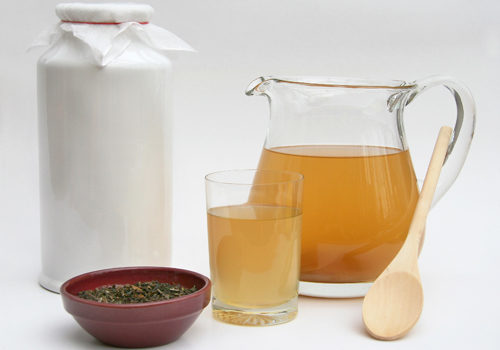![]()
Everyone is talking about the hottest natural products beverage trend that beckons from the fridge with unusual flavors and a funky layer of something floating around inside the bottle. Don’t let that turn you off! It certainly hasn’t stopped anyone else from enjoying it. Kombucha is becoming a hot commodity, with total sales projected to reach $500 million by 2015 (1). So, what exactly is in this trendy drink that has everyone coming back for more? Here, we’ll touch on kombucha’s beginnings, its healthful qualities and its controversial past.
What Is It?!
Kombucha itself is nothing new. For thousands of years, it has been homebrewed and used holistically, starting with what’s called the “mushroom” or SCOBY (Symbiotic Colony of Bacteria), a colony of yeast and bacteria, as the base (2). Basically, kombucha is a tea drink with a little more flair. Tea, sugar and the SCOBY are mixed together and fermented until it becomes a carbonated elixir. Some companies choose to filter out the colony strains purely for texture and drinkability reasons, but most leave them in, which explains what is floating around among the bubbles.
Kombucha can be made with any number of teas, although brewers typically stay away from anything overwhelmingly flavorful, like herbal teas, or those containing oils that may adversely affect the fermenting process, like Earl Grey (3). Black, oolong, green and white are all acceptable teas for brewing, with some cultures using jasmine, sencha green and pu-erh teas (3). Today, most kombucha companies use black tea as a base and add natural ingredients to boost the brew’s healthful qualities and cut the vinegary taste that often results in an unflavored kombucha. These additions include fruit juices like cranberry, raspberry and lemon or citrus, botanical flavors like hibiscus and lavender, and other natural flavorings like ginger and coconut.
Prepare to Be Enlightened
Many kombucha companies boast that their product is an elixir for well-being, but what does that mean in terms of the benefits to the drinker?
Some of the purported benefits of kombucha are that it helps clear up acne, headaches and stress; aids against hemorrhoids, constipation and other GI tract disorders; and has even been used in in vitro animal trials testing its antioxidant, immunostimulating and hypolipidemic effects against cancer, HIV/AIDS and diabetes, although more testing needs to be done before drawing conclusions on what effect kombucha can have on human health (4).
Some companies also promote cleansing and general detoxifying with their kombucha products. As it is derived from tea, kombucha typically contains caffeine in differing amounts depending on the brand.
Side Effects
Reported side effects are most often associated with homebrewed versions of kombucha. These can include stomach upset, infections and allergic reactions, that can most likely be attributed to unsanitary or unsterile brewing conditions, like using a glazed ceramic pot containing lead that can leech out into the tea (2). Large companies bottling kombucha will not have this problem, however allergic reactions should not be counted out due to added flavors and juices and one’s allergies to certain ingredients. Also, due to the acidity of kombucha, it may change the pH level in the stomach and may reduce the absorption of certain medicines (4).
Fermenting Comes With a Price
A reason you may not find kombucha in every natural products store, despite the growing trend, is due to the natural alcohol that results from fermentation. Depending on state laws or store preference, certain kombucha brands or varieties may not be allowed in the refrigerated aisle next to the coconut water and kefir drinks.
Just a few years ago, when kombucha started its rise to more mainstream popularity, an issue arose where two large natural products companies were accused of having more than trace amount of alcohol, or 0.5% in their products, and not declaring so on the label. In fact, investigators found in some bottles up to four or five times the legal amount set by the Alcohol Tax and Trade Bureau, leading kombucha to be taken off some shelves (1). The companies issued apologies, saying they did not intentionally mislead their customers, and one discontinued its line, unable to change the recipe enough to get the alcohol content under the legal limit while at room temperature (1). The other, however, reformulated successfully, and has thrived ever since with multiple lines of kombucha drinks including safe, trace amounts of alcohol in bottles nestled where they belong in the refrigerated drinks aisle.
Newer companies hoping to break into the kombucha market have taken this warning to heart and have been springing up with new flavors and varieties across the country. You can, however, still buy the original, controversial brew, as long as you’re over 21 years old. WF
References
1. R. Latif, “Kombucha Class Action Suits Settled with GT’s, Honest Tea,” BEVNET, Nov. 8 2011, www.bevnet.com/news/2011/kombucha-class-action-suits-settled-with-gts-honest-tea, accessed Mar. 6, 2013.
2. B.A. Bauer, “What Is Kombucha Tea? Does it Have any Health Benefits?” www.mayoclinic.com/health/kombucha-tea/AN01658, accessed Mar. 6, 2013.
3. “Different Tea-Different Taste,” Seeds of Taste, www.seedsofhealth.co.uk/fermenting/kombucha_teas.shtml, accessed Mar. 6, 2013.
4. Memorial Sloan-Kettering Cancer Center, “Kombucha,” www.mskcc.org/cancer-care/herb/kombucha, accessed Mar. 6, 2013.
Published in WholeFoods Magazine, April 2013










